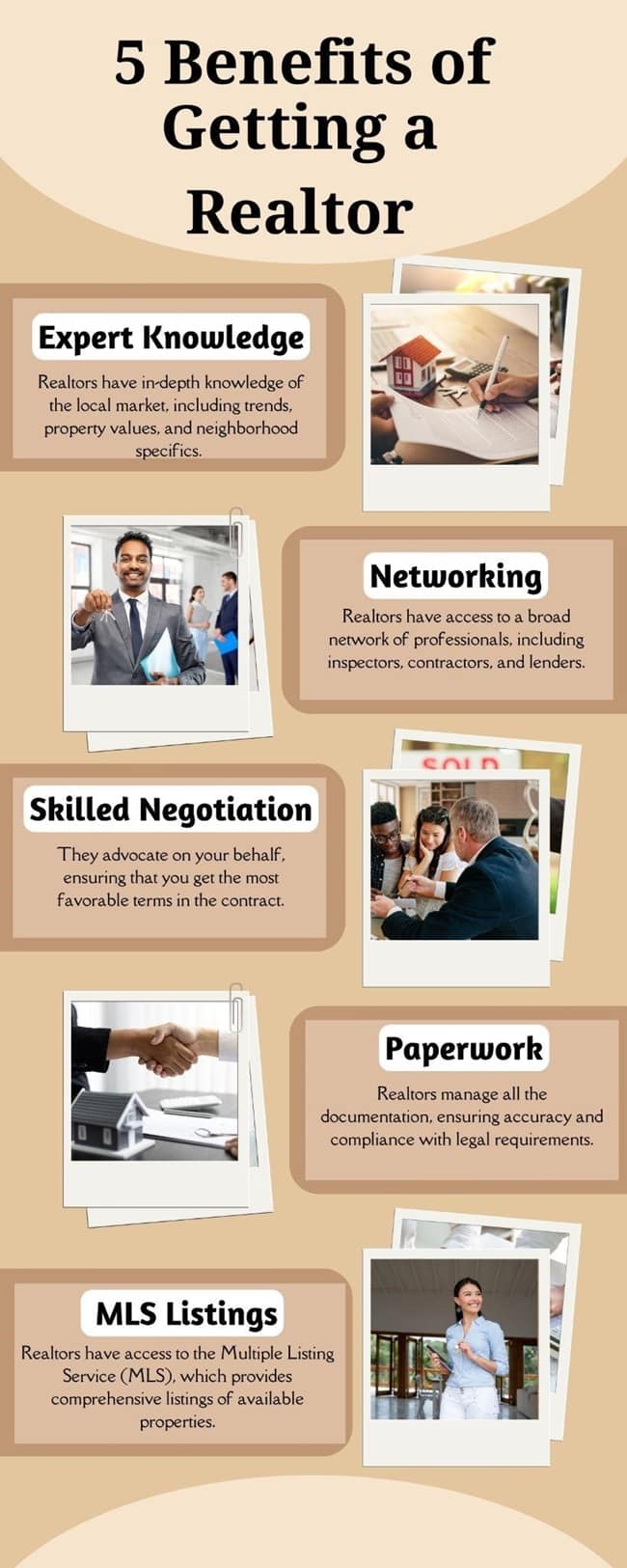Finding the right realtor for your first home purchase is key, especially in today’s real estate market. As of 2024, first-time homebuyers face challenging conditions, with median home prices hovering around $431,000, and mortgage rates reaching highs of nearly 8% in recent months, marking the highest rates in over two decades.
Despite these obstacles, 32% of all buyers are first-time homebuyers, indicating that many people are still entering the market.
Given the current landscape, affordability remains a top concern, with many buyers co-purchasing homes with partners or friends to split the cost.
As you navigate the buying process, partnering with an experienced realtor who understands the local market can make a significant difference in finding the right home within your budget and securing favorable terms. By asking key questions and understanding real estate terms, you’ll be better equipped to make informed decisions.
Finding The Right Realtor: A Guide
Finding the right realtor is a critical step when buying a home, especially if it’s your first time. The real estate market can be complex and overwhelming, and a knowledgeable realtor can simplify the process by offering invaluable insights, negotiating on your behalf, and guiding you through every step of the journey.
With a multitude of options available, knowing how to identify the best realtor for your needs is the way to go.
We will provide you with practical advice on how to assess realtors effectively, what to look for, and how to ensure that the person you choose is the right fit for your homebuying experience.
Asking The Right Questions
The first step to finding the right realtor is asking the right questions. This will help you gauge their experience, expertise, and overall fit for your homebuying journey. One of the most important questions to ask is how long they’ve been working in real estate.
A realtor with several years of experience will have a better understanding of market trends, negotiation tactics, and potential obstacles.
Newer agents shouldn’t be overlooked; sometimes they can offer a fresh perspective and dedicated focus on a smaller clientele.
Another important question is whether the realtor is familiar with the specific neighborhoods or areas where you want to buy. Local market knowledge is invaluable, as real estate trends can differ drastically from one region to another.
A realtor who knows your target neighborhood well will have insider knowledge about recent sales, future development plans, and other factors that can influence your decision.

You should also inquire about their availability. Knowing how often you can expect updates and their preferred communication methods will ensure smoother interactions. It’s vital to ensure that your realtor can meet your needs in terms of response time and availability, especially in a fast-moving market where timing can be critical.
Ask for references. A top-performing realtor should have no problem providing references from past clients, and this can give you a better sense of what working with them will be like. Follow up with those clients to get insights into the realtor’s professionalism, negotiation skills, and overall performance.
Checking Credentials And Certifications
In addition to asking questions, it’s important to verify that your realtor has the proper credentials and certifications.
In the United States, all realtors must be licensed by the state in which they work, so check your state’s real estate commission website to ensure that the realtor is licensed and in good standing. Beyond basic licensure, some realtors may hold additional certifications, which can demonstrate specialized expertise.
For instance, a Certified Residential Specialist (CRS) has additional training and experience in residential real estate, while an Accredited Buyer’s Representative (ABR) is trained to represent home buyers exclusively.
These designations can indicate that a realtor has gone above and beyond in their professional development and may offer an added level of service and expertise.
If you are buying a specific type of property, such as a luxury home, you might look for a realtor who holds the Certified Luxury Home Marketing Specialist (CLHMS) designation.
Understanding The Realtor’s Local Market Expertise
The importance of a realtor’s local market expertise cannot be overstated. Real estate is highly localized, meaning that market conditions, property values, and demand can vary significantly even within the same city.
A realtor with deep local knowledge will have insights into upcoming listings, the pricing dynamics of your target neighborhood, and the types of homes that offer the best value for your budget.
When assessing a realtor’s local expertise, ask about their recent transactions in the area. This will give you a sense of their track record and how well they understand the local market. You can also inquire about their connections in the area.
A well-connected realtor will have relationships with local inspectors, contractors, lenders, and other professionals who can facilitate a smooth transaction.
A realtor with strong local expertise can also provide insights into factors that might not be immediately obvious, such as future development plans that could affect property values or neighborhood trends that could influence your decision.
Evaluating Communication And Availability
Good communication is very important in the homebuying process, and this is an area where many homebuyers struggle with their realtors. Before you commit to working with a particular realtor, make sure their communication style aligns with your preferences.
Some buyers prefer frequent updates via phone or text, while others are happy with occasional emails. Whatever your preference, ensure that the realtor is willing to accommodate it.
In a fast-paced market, timing is everything. If your realtor takes too long to respond to inquiries or isn’t readily available to show properties, you could miss out on the home of your dreams. Therefore, be clear about your expectations upfront.
Ask how many clients they are currently working with to gauge whether they can dedicate the necessary time and attention to your home search. A good realtor should be able to balance multiple clients without compromising the quality of service.
Reviewing Marketing And Negotiation Strategies
An effective realtor should have a solid marketing plan for your home search or sale. If you’re selling, ask about their approach to listing your home—this includes staging, professional photography, and digital marketing strategies like social media and email campaigns.
Realtors who stay up-to-date with modern marketing techniques can attract more potential buyers and create more interest in your property.
When buying, the realtor’s negotiation skills will come into play. An experienced realtor will know how to navigate competitive markets, ensuring you get the best possible deal without losing out on your desired property.
Ask for examples of past negotiations and how they have successfully secured deals for their clients. You should feel confident that your realtor can advocate for your interests when negotiating offers and contracts.
Exploring Technology And Resources
In today’s tech-driven world, many realtors use advanced tools to help clients find homes faster and more efficiently.
These tools include access to Multiple Listing Services (MLS), automated email alerts for new listings, virtual tours, and even artificial intelligence-based platforms that help narrow down property searches.
Ask your realtor what technology they use to assist clients and how it will benefit you. A realtor who embraces technology can offer you a competitive advantage, especially in a fast-moving market.
They may be able to arrange virtual tours if you’re unable to visit homes in person, or send you instant alerts when new homes matching your criteria hit the market.
Some realtors also have access to off-market listings, which are homes that aren’t listed on the open market. These opportunities can give you an edge in competitive areas where homes sell quickly.

Wrapping Up
Finding the right realtor for your first home is not just about asking questions and evaluating credentials—it’s also about building a relationship based on trust and communication.
Your realtor should be an advocate who understands your needs and offers sound advice in a constantly shifting market.
Don’t hesitate to take your time in making this decision, as choosing the right professional can significantly influence your homebuying experience and the final outcome.




























